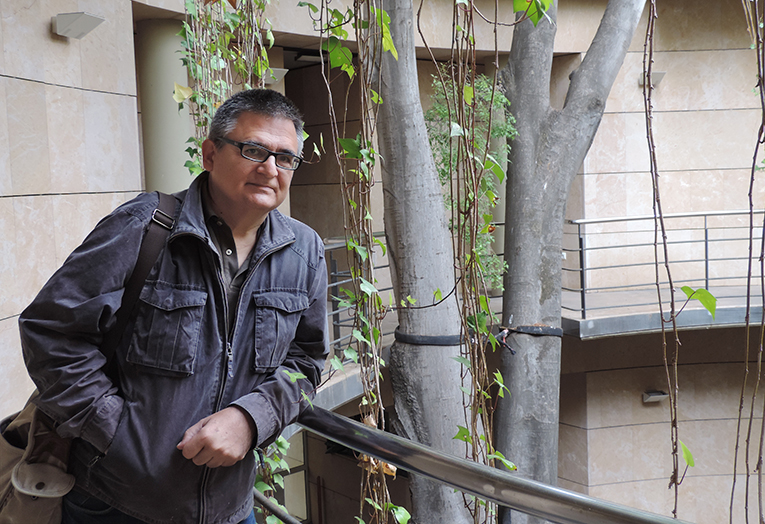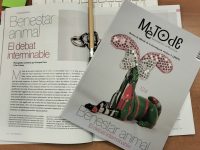«Communication is the bridge between science and the general public»
Coordinator of the first CTEM Conference in the Valencia region

 «Towards a scientific, mathematic and technological literacy in the twenty-first century» is the premise under which the I CTEM Conference (Science, Technology, Engineering and Mathematics) will take place in the Valencia region. Around 300 education professionals will share experiences and look into innovative alternatives to improve scientific training. This will be one of the many activities at the Primavera Educativa (Educational Spring), organised by the Department of Education of the Valencian autonomous government. The CTEM Conference will be held at the Benlliure High school of Valencia on 13, 14 and 15 May, 2016.
«Towards a scientific, mathematic and technological literacy in the twenty-first century» is the premise under which the I CTEM Conference (Science, Technology, Engineering and Mathematics) will take place in the Valencia region. Around 300 education professionals will share experiences and look into innovative alternatives to improve scientific training. This will be one of the many activities at the Primavera Educativa (Educational Spring), organised by the Department of Education of the Valencian autonomous government. The CTEM Conference will be held at the Benlliure High school of Valencia on 13, 14 and 15 May, 2016.
José Azkárraga, member of the CTEM organisation committee and professor at the Experimental and Social Sciences Teaching Department of the University of Valencia, speaks with Mètode about the importance of the general public having some basic scientific knowledge. Building a bridge between science and society is a complex task. Azkárraga tells us why it is worth to start working on it. The CTEM is only the first step.
The relations between science and society will be one the topics addressed at the Congress. Do you think that sometimes they appear to be too far from each other despite the bond that unites them?
Yes, and this is where the work of science educators starts. Universities and research centres should also participate in this work. In fact, they are doing it. Oxford’s model, with their chair of Public Understanding of Science, is spreading. There is an increasing number of universities that offer research communication services aimed not only at scholars, but at society. Mètode is an example of this.
Why science communication is so important?
It is the bridge between science and the general public. Also, this way scientific knowledge does not remain trapped inside those ivory towers that labs, college departments and research centres can be. I think researchers are responsible for bringing their projects, which are mainly funded with public money, to the public community. This way, everyone can benefit from their work.
Would people feel closer to science if its connection with current social affairs was made more evident?
Yes. Nowadays we can say that scientific topics are present in the news, especially health-related issues and technological innovations. These topics have some impact, but often they are offered simply as snippets with no actual depth. But, to understand these news, some basic scientific knowledge is needed. Science has become relevant, but often people lack basic notions to fully understand news about it.
Is education important in this?
It is essential. And this is our goal: that everyone gains access to every aspect of science: technology, math, etc. It is also important that the population, especially school children, becomes well trained in these fields.

The lack of scientific knowledge presents two problems. On one hand, not having enough information about matters that may affect our lives directly. On the other hand, there is a deeper issue that has to do with a rational understanding of the world. Science does not only give information about how the world works: its methodology and ways to address different problems are based on rationality. Unfortunately, pseudosciences are very popular nowadays: you just need to turn on the TV and see the number of channels that hire fortune-tellers to talk about «the future». If so many channels do this, it is because they find an audience. Therefore, one of the responsibilities of science – besides informing about how the world functions – is to help us consider our existence from a rational point of view.
Is this a significant issue to understand environment-related topics? Might this lack of scientific background affect, for instance, sustainable development?
Yes. If everyone had a better understanding of the environment and how we can help it with low energy consumption, it would be very positive. The basic functioning of an ecosystem, the material and energy cycles… All these basic notions can help us to give a step forward. If no one knew about these interactions, about the problems that a careless use of resources might cause, and where the energy that we use comes from… But all these problems can be overcome with knowledge.
The CTEM does not believe in the separation of science and letters, but in a unique culture. Why is it so important to get this message across?
Actually, the CTEM does not speak of a unique culture. We are at an early stage. What we aim for is a unique culture in the science field. That is, that all sciences are related. Evidently this belongs to a wider philosophy that does not divide culture in types. The CTEM aims for a global science. The unique culture that you mentioned would be the next step.
So, we are in our way to scientific literacy, and the next step would be linking both fields?
Yes, exactly. In life there are not airtight compartments. Things come together and mixed and it is absurd to separate these two fields as it has been traditionally done. Science to one side, letters to the other.
What does the education system lack in this aspect?
Firstly, the education system applies a fractioned perspective. For instance, one the most serious problems is the fact that there are too many subjects in the first course of Secondary Education. Also, they are hermetic units. They need to be grouped. You cannot ask a twelve-year-old to carry on with that many subjects. Also, many times teachers are not well coordinated and there are problems to bring different areas close together. This is a serious problem. The CTEM sees science from a global perspective, within a more unitary approach.
Marta Navarro. Journalism student at the University of Valencia.
© Mètode 2016.





